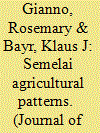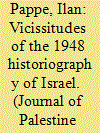| Srl | Item |
| 1 |
ID:
129455


|
|
|
|
|
| Publication |
2014.
|
| Summary/Abstract |
There has been a long-entrenched view that China's Qing Dynasty was a 'Manchu Dynasty', which imposed alien conquest on China's majority of the ethnic Han. Such a view has made the Manchus allegedly responsible for all the social evils from the 1840 Opium War onwards on the one hand and all the 'anti-Manchu' sentimentalities and movements, such as the Taipings and Republicans, automatically legitimate and revolutionary on the other. This article challenges this stereotype and argues with historical evidence that the 'Manchu rule' was a myth. Social conflicts in late Qing were mainly between the Han Chinese themselves. It is time to end the 'Manchu rule' as an easy pretext to conceal the true social issues and problems in the nineteenth- and twentieth-century China.
|
|
|
|
|
|
|
|
|
|
|
|
|
|
|
|
| 2 |
ID:
130264


|
|
|
|
|
| Publication |
2014.
|
| Summary/Abstract |
Is the nuclear domino theory historically valid? Despite its longstanding centrality to thinking on nuclear proliferation amongst scholars and policymakers, in recent years a revisionist consensus has emerged in opposition to this traditional view. Based on an analysis of historical evidence from the aftermath of the 1964 Chinese nuclear test, this article argues that scholars have gone too far in rejecting the nuclear domino theory. Reactive proliferation has been more prevalent than commonly believed, and while it is true that only India acquired a nuclear arsenal in response to the Chinese test, to a significant extent this is precisely because the United States was aware of the danger of reactive proliferation and worked to stop it. Finally, the historical evidence suggests that the nuclear domino theory is compatible with both domestic and prestige motivations for proliferation in addition to the security motives normally associated with the theory.
|
|
|
|
|
|
|
|
|
|
|
|
|
|
|
|
| 3 |
ID:
089374


|
|
|
|
|
| Publication |
2009.
|
| Summary/Abstract |
What were the indigenous agricultural and population patterns in peninsular Malaysia's southern lowlands? What factors produced these patterns? Based on our analysis of ethnographic and historical evidence, as well as aerial photographs taken in 1948 in the Tasek Bera and Sungai Bera watersheds, the Semelai, an Orang Asli group, had a robust and productive subsistence agricultural system emphasising rice but insured by cassava. These photographs, from the P.D.R. Williams-Hunt Collection, provide an unusual record of Semelai agriculture prior to settlement in 1954 and contribute to our knowledge of indigenous economic patterns in the southern lowlands, which have received little ethnographic attention.
|
|
|
|
|
|
|
|
|
|
|
|
|
|
|
|
| 4 |
ID:
093947


|
|
|
|
|
| Publication |
2009.
|
| Summary/Abstract |
Arguing that history writing is a dialectical process fusing ideological agenda and political developments with historical evidence, the author analyzes the two major transitions experienced by the Israeli historiography of the 1948 war: from the classical Zionist narrative to the "New History" of the late 1980s, and from the latter to the emergence of a "neo-Zionist" trend as of 2000. While describing the characteristics of these trends, the author shows how they are linked to concurrent political developments. Most of the article is devoted to an examination of the neo-Zionist historians who have emerged in recent years, based on their previously untranslated Hebrew works.
|
|
|
|
|
|
|
|
|
|
|
|
|
|
|
|